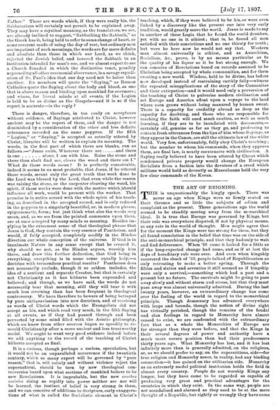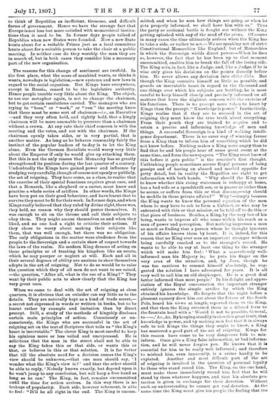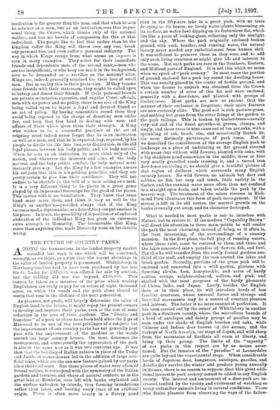THE ART OF REIGNING.
THIS is unquestionably the kingly epoch. There was never an age when Kings were so firmly seated on their thrones and so little the subjects of odium and complaint as the present. Three generations ago the world seemed to be steadily moving away from the monarchical ideal. It is true that Europe was governed by Kings, but their rule was everywhere disputed, if not by physical means, at any rate in the world of thought. Men might agree that for the moment the Kings were too strong for them, but they all found consolation in the belief that time was on the side of the anti-monarchical principle, and that they had only to wait and find deliverance. When '48 came it looked for a little as if the long-expected change had come, and as if at last the days of hereditary rule were over. And even when kingship recovered the shock of '48, people talked of Republicanism as only retreating to make a better spring. Through the fifties and sixties and seventies it still seemed as if kingship were only a survival,—something which had a past and a present but no future. The survivals might be going to pass away slowly and without storm and stress, but that they must pass away was almost universally admitted. During the last twenty years, however, an extraordinary change has come over the feeling of the world in regard to the monarchical principle. Though democracy has advanced everywhere with leaps and bounds, though the notion of divine right has virtually perished, though the remains of the feudal and clan feelings in regard to Monarchy have almost ceased to exist, we are confronted with the extraordinary fact that as a whole the Monarchies of Europe are far stronger than they were before, and that the Kings in their several degrees of power and authority have a much more secure position than had their predecessors thirty years ago. What Monarchy has lost, and it has lost infinitely more than is generally admitted, on the religious, or, as we should prefer to say, on the superstitions, side—for true religion and Monarchy never, in reality, had any binding connection—it has gained on the utilitarian side. Monarchy as an extremely useful political institution holds the field in almost every country. People do not worship Kings any longer, but they have come to be regarded as capable of producing very great and practical advantages for the countries in which they exist. In the same way, people are not scandalised and alarmed as they used to be at the mere thought of a Republic, but rightly or wrongly they have come
to think of Republics as inefficient, tiresome, and difficult forms of government. Hence we have the strange fact that Europe isnot less but more satisfied with monarchical institu- tions than it used to be. In former days people talked of Republics when new States were founded. Now a new State hunts about for a suitable Prince just as a local committee hunts about for a suitable person to take the chair at a public meeting. In neither case do they worship the man they are in search of, but in both cases they consider him a necessary part of the new organisation.
The reasons for this change of sentiment are twofold. In the first place, what the mass of mankind wants, or thinks it wants, nowadays is legislation,—new systems and new laws in regard to the social organism. But Kings have everywhere, except in Russia, ceased to be the legislative authority. Hence people trouble very little about the King. The object, to use our metaphor again, is not to change the chairman, but to get certain resolutions carried. The managers who are trying to " boss," or "work," or "run" the meeting know that there must be some sort of chairman—i.e., an Executive —and they very often hold, and rightly bold, that a kingly chairman will be more amenable to pressure than a chairman without a crown. At any rate their chief concern is with the meeting and the votes, and not with the chairman. If the chairman openly takes sides, or is very partial, that is another matter. As long as he behaves reasonably fairly the instinct of the popular leaders of to-day is to let the King alone. Even the German Socialists would worry very little about the Emperor if only he would give up attacking them. But this is not the only reason that Monarchy has so greatly strengthened its position during the last quarter of a century. Undoubtedly the Kings have gained power and influence by studying very carefully, though of course not openly or publicly, the art of reigning. They have come, as a class, to realise that the exercise of their special functions requires great care, and that a Monarch, like a shepherd or a carter, must know and practise a whole series of artifices. In other words, the Kings have been put on their good behaviour, and have learnt that to survive they must be fit for their work. In former days, and when Kings really believed that they ruled by divine right, there was, they held, no reason why they should pester themselves. It was enough to sit on the throne and call their subjects to obey them. They might amuse themselves as and when they liked, and no one had a right to criticise their actions. If they chose to worry about making their subjects like them, that was well enough, but there was no obligation. The only obligations in the matter were obedience from the people to the Sovereign and a certain show of respect towards the laws of the realm. No modern King dreams of acting on these principles or of treating his kingdom like an estate, which he may pamper or neglect at will. Each and all in their several degrees of ability are anxious to show themselves adepts in the art of reigning. Not to do so would be to raise the question which they of all men do not want to see raised, —the question, "After all, what is the use of a King?" They want by their public acts to show clearly that the King has very great uses.
When we come to deal with the art of reigning at close quarters, it is obvious that an outsider can say little as to the details. They are naturally kept as a kind of trade secret,— a secret not expressed in words or written in books, but to be learnt rather by example and imitation than by direct precept. Still, a study of the methods of kingship discloses certain main principles of action. Consciously or un- consciously, the Kings who are successful in the art of reigning act on the text of Scripture that tells us " the King's heart is inscrutable." The clever King is most careful to keep his opinions more or less veiled and unexpressed. He is solicitous that the man in the street shall not be able to say the King takes this or that side, or wants this or that, or believes in this or that solution. It is far better that till the absolute need for a decision comes the King's 'view should be unknown,—t bat one man should say, ' I wonder what the King's view is ? ' and that the other should be able to reply, Nobody knows exactly, but depend upon it he won't jump to any conclusion, but will keep a free hand as long as he can.' The King, in fact, remains uncommitted until the time for action arrives. In this way there is no leakage of popularity. Each side, however vehement, is able to feel: "It'll be all right in the end. The King is uncom.
milted, and when he sees how things are going, or when he gets properly informed, we shall have him with us." Thrte the party or sectional battle is fought out without the King getting splashed with any of the mud of the arena. Of course in many cases the time ultimately arrives when the King has to take a side, or rather to act.—We are speaking not of strict Constitutional Monarchies like England, but of Monarchies in which the Sovereign wields direct power.—When he does so, however, the fact that he has been np to that moment uncommitted, enables him to break the fall of the losing side. The King acts, in fact, like a Judge, and, like a Judge, if he is wise only gives his decisions on the points directly before him. He never allows any deviation into obiter dicta. But though the King commits himself as little as possible, and guards an inscrutable heart in regard to the thousand and one things over which his subjects are battling, he is most careful to keep himself closely and precisely informed on all matters that have the slightest concern with the exercise of his functions. There is no precept more taken to heart by Kings than the precept, " Knowledge is power." Instinctively, Kings realise that if they are to succeed in the art of reigning they must know the true truth about everything. From their youth they are trained to acquire and to retain a precise and informing knowledge of men and things. A successful Sovereign is a kind of walking intelli- gence department. There is no surer way of winning favour from a King than to inform him of something which he did not know before. Nothing makes a King more angry than to find that he and his people hear of some great event at the same time, and from the newspapers. " The King must know of this before it gets public" is the courtier's first thought. Unthinking people sometimes accuse Royal persons of being gossips and of having an absurd and morbid appetite for petty detail, but in reality the Royalties are right to get information with both hands. " Why should the King care to know whether this rising statesman is unhappy at home, has a bad wife or a spendthrift son, or is pourer or richer than he seems, or suffers from this or that disease,—why should he meddle in these private affairs P" Why ?—simply because the King wants to know the personal equation of the men whom he may have to ask to form a Cabinet, or who may be entrusted with this or that mission, or be told off to do this or that piece of business. Besides, a King, by the very law of his being, wants to impress all who come within his reach as a, man of power and perception. But nothing impresses a man so much as finding that a person whom he thought ignorant of his affairs knows them by heart. It is, indeed, for this reason that no King ever sees an important stranger without being carefully coached as to the stranger's record. He wants to be able to say at least one thing to the stranger which will make him feel : What a marvellously well- informed man his Majesty is; he puts his finger on the very crux of the situation, and, by Jove, though he was too cautious to commit himself absolutely, he sug- gested the solution I have advocated for years. It is all very well to call him an old shopkeeper. He is a great deal better informed than most people.' In his delight and appre- ciation of the Royal conversation the important stranger entirely ignores the simple artifice by which the King obtained his knowledge. He forgets that the night before a pleasant equerry drew him out about the future of the South Pole, heard his views at length, reported them to the King, and that then the King returned them in a diluted form to the fountain head with a' Would it not be possible, General, to—,' &c., &c. By keeping steadily in view this great truth, that knowledge is power, and by making men feel that it is always safe to tell Kings the things they ought to know, a King has mastered a good part of the art of reigning. Kings for this reason have come to be very dangerous folk to mis- inform. Once give a King false information, or bad informa- tion, and he will never forgive you. He knows that it is essential for him to be really well informed ; and therefore to mislead him, even innocently, is a crime hardly to be expiated. Another and most difficult part of the art of reigning is involved in the question of personal loyalty to those who stand round him. The King, on the one hand, must make those immediately round him feel that he will stand by them whatever happens, and that his absolute pro- tection is given in exchange for their devotion. Without such an understanding he cannot get real devotion. At the same time the King must give his people the feeling that the institution is far greater than the man, and that when he acts he acts not as a man, but as an institution,—as that imper- sonal thing, the Crown, which thinks only of the national welfare, and has no bowels of compassion for this or that individual. The people like to feel that rather than let the kingdom suffer the King will throw over any one, break any personal ties, and even suffer a personal indignity. The way in which Kings escape from what seems an impasse is seen in many examples. They select for their immediate friends and dependents men of the second rank,—men who are too insignificant, or who keep too much in the background, ever to be demanded as a sacrifice on the national altar. Kings are, indeed, generally satirised for their love of small men. But in reality this is their protection. If they became close friends with their statesmen, they might be called upon to betray and desert their friends. If their personal friends are private secretaries, equerries, and regular Court officials, men with no power and no policy, there is no risk of the King being called upon to injure a loyal and devoted friend as an act of policy. By having nonentities round them they avoid being exposed to the charge of deserting men under fire, and keep that free hand in dealing with men and affairs of State which gives them their strength. A King who wishes to be a successful practiser of the art of reigning must indeed never forget that he is an institution as well as a man, and that he is expected, nay, required, by his people to divide his life into two,—to distinguish, in the old legal phrase, between his body politic and his body natural. When he acts as an institution he must think only of the nation, and whenever the interests and aims of the body natural and the body politic conflict, the body natural must instantly give way. Let the King by a few examples assure his subjects that this is his guiding principle, and they are pretty certain to give him their confidence. They will not endure to be chattels at the will of a man acting as a man. It is a very different thing to be pieces in a great game played by an impersonal Sovereign for the good of the pieces. This carries with it no humiliation. They know that some hand must move them, and think it may as well be the King's as anther's,—provided always that if the King becomes mad, a dipsomaniac, or a dotard, they ean put another in his place. In truth, the possibility of deposition or of enforced abdication of the individual King has given an enormous extra strength to Monarchy. The irremovable idiot King, more than anything else, made Monarchy seem an intolerable wrong.




































 Previous page
Previous page